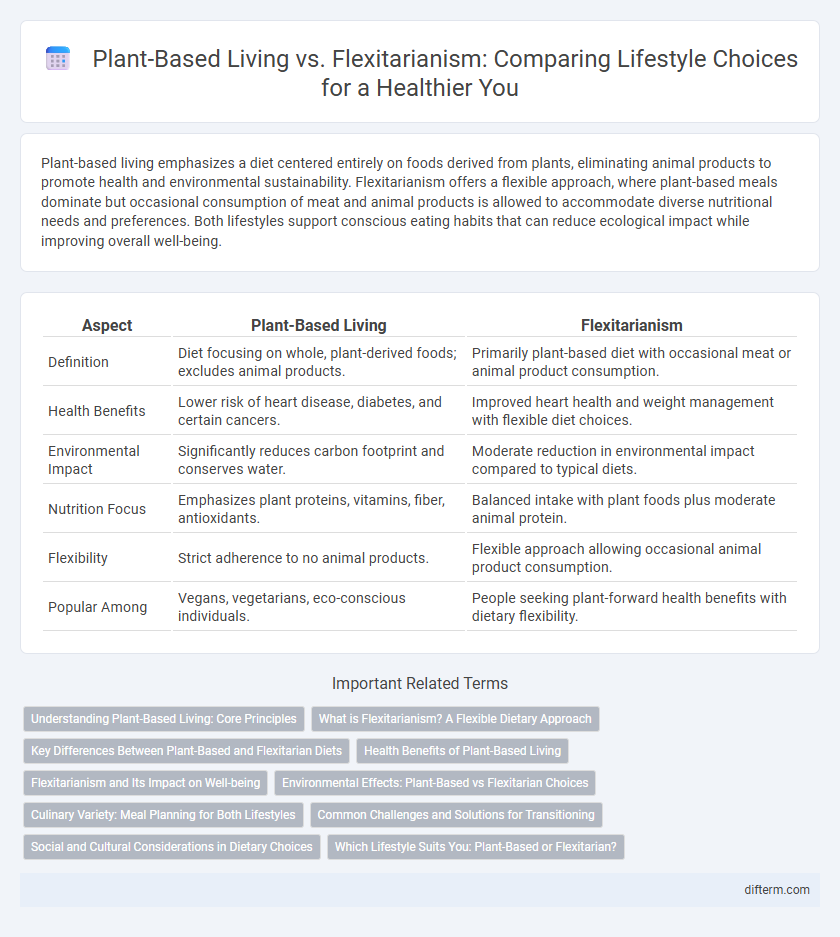Plant-based living emphasizes a diet centered entirely on foods derived from plants, eliminating animal products to promote health and environmental sustainability. Flexitarianism offers a flexible approach, where plant-based meals dominate but occasional consumption of meat and animal products is allowed to accommodate diverse nutritional needs and preferences. Both lifestyles support conscious eating habits that can reduce ecological impact while improving overall well-being.
Table of Comparison
| Aspect | Plant-Based Living | Flexitarianism |
|---|---|---|
| Definition | Diet focusing on whole, plant-derived foods; excludes animal products. | Primarily plant-based diet with occasional meat or animal product consumption. |
| Health Benefits | Lower risk of heart disease, diabetes, and certain cancers. | Improved heart health and weight management with flexible diet choices. |
| Environmental Impact | Significantly reduces carbon footprint and conserves water. | Moderate reduction in environmental impact compared to typical diets. |
| Nutrition Focus | Emphasizes plant proteins, vitamins, fiber, antioxidants. | Balanced intake with plant foods plus moderate animal protein. |
| Flexibility | Strict adherence to no animal products. | Flexible approach allowing occasional animal product consumption. |
| Popular Among | Vegans, vegetarians, eco-conscious individuals. | People seeking plant-forward health benefits with dietary flexibility. |
Understanding Plant-Based Living: Core Principles
Plant-based living emphasizes whole, minimally processed foods derived primarily from vegetables, fruits, legumes, nuts, and seeds, excluding animal products entirely. This lifestyle prioritizes nutrient density, environmental sustainability, and ethical considerations regarding animal welfare. Understanding these core principles distinguishes plant-based diets from flexitarianism, which incorporates occasional animal products while focusing on plant-forward meals.
What is Flexitarianism? A Flexible Dietary Approach
Flexitarianism is a flexible dietary approach that emphasizes primarily plant-based foods while allowing occasional consumption of meat and animal products. This lifestyle balances the health benefits of plant-based nutrition with the convenience and social aspects of eating animal-derived foods in moderation. By reducing meat intake without complete elimination, flexitarians support sustainability and improve overall wellness through a nutrient-rich diet.
Key Differences Between Plant-Based and Flexitarian Diets
Plant-based diets emphasize consuming primarily whole, minimally processed plant foods such as vegetables, fruits, grains, nuts, and legumes, often excluding all animal products. Flexitarian diets, on the other hand, focus on a predominantly plant-centered approach but allow occasional inclusion of meat, dairy, and other animal-based foods. The main difference lies in strictness and flexibility, where plant-based living promotes complete or near-complete plant consumption while flexitarianism prioritizes balance and moderation.
Health Benefits of Plant-Based Living
Plant-based living promotes heart health, reduces the risk of type 2 diabetes, and supports weight management through nutrient-dense, fiber-rich foods. This lifestyle emphasizes whole grains, legumes, fruits, and vegetables, which contain antioxidants and essential vitamins that improve overall well-being. Compared to flexitarianism, a fully plant-based diet often leads to more consistent improvements in cholesterol levels and inflammation markers.
Flexitarianism and Its Impact on Well-being
Flexitarianism, characterized by primarily plant-based eating with occasional inclusion of animal products, promotes a balanced diet rich in nutrients and antioxidants that support overall well-being. This dietary approach reduces the risk of chronic diseases such as heart disease, type 2 diabetes, and certain cancers by encouraging higher intake of fruits, vegetables, whole grains, and legumes. Research indicates that flexitarian diets enhance gut health, improve weight management, and contribute to sustainable environmental impact while maintaining nutritional flexibility and satisfaction.
Environmental Effects: Plant-Based vs Flexitarian Choices
Plant-based diets significantly reduce greenhouse gas emissions by eliminating animal agriculture, which is a leading source of methane and deforestation. Flexitarianism, while allowing limited animal product consumption, contributes to lower environmental impact compared to standard omnivorous diets by promoting more sustainable meat choices and increased plant intake. Studies show adopting a fully plant-based diet can cut food-related carbon footprint by up to 50%, whereas flexitarian diets achieve approximately 20-30% reductions.
Culinary Variety: Meal Planning for Both Lifestyles
Plant-based living emphasizes diverse fruits, vegetables, legumes, and grains, requiring creative meal planning to maximize nutrient intake and flavor profiles. Flexitarianism allows occasional meat and dairy, offering broader culinary variety and easier integration of traditional dishes with plant-based options. Strategic meal planning in both lifestyles ensures balanced nutrition and maximizes the enjoyment of varied textures, flavors, and cultural cuisines.
Common Challenges and Solutions for Transitioning
Transitioning to plant-based living or flexitarianism often involves overcoming common challenges like meal planning, ensuring balanced nutrition, and managing social situations. Solutions include using diverse plant-based recipes to maintain nutrient intake, incorporating gradual changes to ease adjustment, and seeking community support or resources for motivation. Understanding these strategies helps sustain long-term adherence to either lifestyle while promoting health and environmental benefits.
Social and Cultural Considerations in Dietary Choices
Plant-based living often aligns with ethical and environmental values deeply rooted in cultural identity, influencing social acceptance and community bonding. Flexitarianism offers a more adaptable approach, accommodating diverse cultural traditions and social settings by allowing occasional meat consumption. Both dietary choices reflect evolving societal norms around health-consciousness and sustainability, shaping communal dining experiences and cultural expression.
Which Lifestyle Suits You: Plant-Based or Flexitarian?
Choosing between a plant-based lifestyle and flexitarianism depends on your dietary goals and flexibility. Plant-based living emphasizes whole, minimally processed fruits, vegetables, legumes, nuts, and grains, promoting environmental sustainability and heart health through strict avoidance of animal products. Flexitarianism offers a more adaptable approach, allowing occasional consumption of meat and animal-based foods while primarily focusing on plant-rich meals, making it suitable for those seeking gradual dietary changes without strict restrictions.
plant-based living vs flexitarianism Infographic

 difterm.com
difterm.com